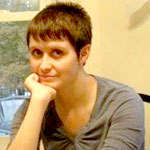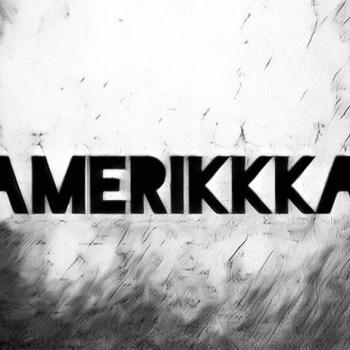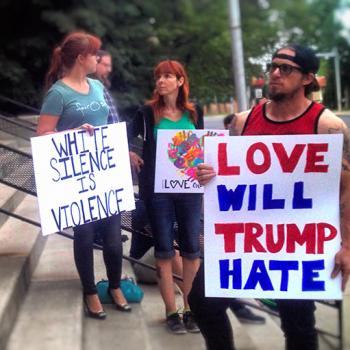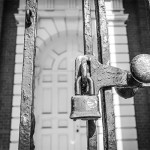
Last week, I learned that the Duggar family will be participating in a documentary on child sex abuse in conjunction with Darkness to Light and Rape, Abuse & Incest National Network (RAINN).
Last month, Jill and Jessa Duggar appeared on Fox News to talk about their abuse experience and how they’ve forgiven their brother Josh for molesting them. In the interview, the young women minimized what was done to them, saying that Josh was merely “sexually curious” and that the abuse wasn’t that bad.
Though it turned my stomach, it did not surprise me at all. Had a TV reporter sat down with me at age 24, I would have said pretty much the same thing.
At age 8, I was similarly molested by someone close to me. At the time the abuse occurred, I knew that it was wrong, or at least very weird. But I didn’t understand it. Growing up in fundamentalism means that you often don’t have words to explain experiences that occur outside of your worldview–words like rape, consent, agency, autonomy, erotic, vagina, and molestation. For the first three years post-abuse, I was confused about what happened. I wasn’t angry, just confused. I didn’t know what had happened to me or how to contextualize it.
But then, when I was about 11 years old, the reality hit me out of the blue. Suddenly, I had a word to explain my experience. And with that word came the rage. I knew then, without a doubt, that I had been violated in a very terrible way.
The word gave me power. But it was a power I was not free to exercise. My abuser approached me one day for a hug, and I refused. Another family member, unaware of the abuse, was present and struck me angrily across the back, hard enough to nearly take the wind out of me. “Don’t treat him that way,” they said. “That’s rude. You don’t do that to people who love you.”
So I hugged him. Later, I wrote him poems. I made him cards. I gave him gifts. I loved him so well, I fooled everyone–including myself.
And the thing is, in spite of how angry and violated I felt, I wanted to love him. I wanted our relationship to be good. And he apologized for the abuse. He said he regretted it. That should have made everything ok, right?
Except, it didn’t. Every time he hugged me, or smiled at me, or told me I was pretty, I felt sick inside. Was that compliment innocent? Or was he sexualizing my body again? Was he being genuinely affectionate? Or was he getting off on touching me?
There were times I didn’t have to wonder.
Yet I prayed. I prayed for God to help me forgive so I wouldn’t be so angry. So I wouldn’t shudder every time he touched me. If I could just get over the pain and revulsion caused by this one night of abuse, we could have a normal, healthy relationship. It would be a wonderful testimony of God’s restorative power.
I finally got to a point in my early 20’s where I believed I had forgiven and healed as much as was possible. If Megyn Kelly had dragged me on national TV then, I would have said that I had forgiven. I had moved on. The problem was taken care of. My abuser was sorry. It was just a mistake, a moment of weakness on his part. I would have said that my abuser was really a good person on the inside. A gentle man. A Christian man. Someone who had helped and was loved by so many people. And it would not have been a lie. I believed it.
I believed it until the wounds overwhelmed me and I fell apart two years ago.
I believed it until I saw my abuser for who he really was.
To really see the truth, I had more words to learn. I had to learn what repentance really means. I had to learn about entitlement. I had to learn about trauma, remorse and amends. I had to learn about perversion and covert incest. These words brought me into the true reality of my experience. It was only then that I understood that the abuse was not merely a “mistake.” It was not just a “shortcoming.” It was coercion. It was calculated exploitation of my trust, powerlessness, and naïveté by an authority figure who fancied himself entitled to my body. It was annihilation of my innocence and personhood.
Only after learning these words did I feel the full horror of what had been done to me. And only that has given me the power to heal and set necessary boundaries in my life.
My abuser says he is sorry. He has sobbed whenever I have mentioned the abuse. But he is not repentant. How do I know? Because he still won’t acknowledge that he has a problem. He still won’t seek professional counseling. He feels he has suffered enough and thinks he doesn’t deserve to have boundaries set against him.
That’s why I feel compelled to speak out on the Duggar issue. I know what it’s like to live in a strict religious community that deprives victims of the language that would help them properly contextualize their experience. I know what it’s like to feel obligated to forgive and reconcile for the sake of one’s Christian witness. I know what it’s like to desperately want to love someone close to you and, thus, choose to view their horrible actions as simply “mistakes.” When Jill and Jessa say they’ve forgiven, I believe it. I believe it because I’ve been in their shoes. Just a few years ago, I would have defended my abuser, too. And meant it.
I just pray Jill and Jessa have been given the proper tools and space to heal.
 About April Kelsey
About April Kelsey
April Kelsey is the author of the blog Revolutionary Faith. She lives in Virginia with her husband, two sons and two cats. Her life goal is to put the final nail in the coffin that is Christian fundamentalism.












